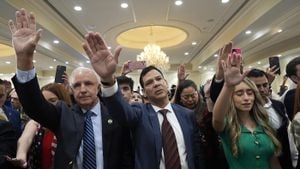Donald Trump’s choice of Tulsi Gabbard as the next Director of National Intelligence (DNI) has already sent ripples of reaction across the political spectrum, cementing another layer of intrigue as he builds his new administration just weeks after his election victory. Gabbard, once known as a Democrat, has been increasingly vocal about her alignment with Trump's skepticism of the U.S. intelligence community, making her selection not just controversial but emblematic of the shifts within party lines.
Gabbard, who served as the U.S. Representative for Hawaii, first caught the national spotlight during her campaign for the Democratic presidential nomination. Her platform, which prominently featured anti-war sentiment and criticisms of U.S. foreign policy, won her both supporters and skeptics as she garnered attention not only for her positions but also for her background as the first Hindu elected to Congress.
This new role is expected to place her at the helm of 18 different agencies, including the CIA and the FBI, positions of extensive responsibility and influence. Historically, those appointed to such roles have held prior experience within the intelligence community. Gabbard, who has soldiered on as an input on military and foreign affairs, lacks the deep-seated ties to intelligence agencies her predecessors had, often raising eyebrows among critics.
During her congressional career, she often stood up to leaders within her party, which might suggest she carries the spirit of independence to where she is now. Rather than softening her views, Gabbard has shifted them. Since announcing her departure from the Democratic Party and embracing the Trump agenda, she has become increasingly popular among the MAGA crowd, pairing her stance with Trump’s own narrative.
Under pressure from within and outside the Republican Party, Gabbard's nomination has drawn some harsh critiques, particularly from figures within the GOP itself. John Bolton, the former U.S. Ambassador to the United Nations under the Bush administration, labeled it "the worst cabinet-level appointment in history," showcasing the clear divide her selection may be stirring.
Bolton's comments resonate with longtime GOP members who see Gabbard's newfound alignment with Trump as disruptive, pointing to her past criticisms against U.S. military interventions. “Trump is not antiwar,” Bolton emphasized. “His administration will lead us down a path of abandoning our allies. It will be so incredibly erratic …” This echoes broader concerns inside the party about the direction Trump's administration might take, especially concerning military strategy and foreign relations.
Gabbard has engaged with conservative platforms and personalities since her departure from the Democratic Party. Her crossover appeal was demonstrated when she endorsed Trump early on, gaining mentions alongside Trump and Robert F. Kennedy Jr., who also transitioned his political affiliation to back the former president. This has reinforced her stature among Trump supporters, especially as she prepares to help shape the policies of the incoming administration.
Despite her military background, which involves service as an officer with the Army National Guard, critics question her readiness for the DNI role. Compared to her predecessor Avril Haines, who held high-ranking spots within the CIA and the Obama administration, Gabbard’s qualifications may seem nominal. Nonetheless, her previous positions on various committees, including the House Homeland Security Committee, provide her with some experience relevant to national security.
Gabbard has frequently criticized the Washington establishment for what she describes as partisan warfare and has promised to approach her new role with scrutiny and resolve. "I am confident my first task will be to work to bring us back from the brink of potential conflicts," she has stated, signifying her intention to redirect the nation’s intelligence approach.
Trump’s Cabinet picks overall reflect an appetite for loyalty over traditional expertise. Alongside Gabbard, he has nominated figures such as his erstwhile adversary, Marco Rubio, and staunch Trump supporter Matt Gaetz, who has been nominated as Attorney General. Each nomination suggests Trump is leaning on associates who align closely with his ideological stance rather than career professionals typically chosen for such positions.
The broader sentiment among political analysts is polarized. Some view Gabbard’s appointment as potentially refreshing, allowing for unorthodox ideas and new approaches to rise through the ranks. Others express fear, arguing this could lead to more instability, particularly amid growing global tensions and responsibilities:
“How can someone with such limited experience manage the varied and often complicated interests and national security concerns of the country?” one analyst wondered. “If Gabbard cannot handle the heat, America could pay the price.”
Dealing with intelligence matters today is complex and requires deft navigation through layers of national interests, potential conflicts, and diplomatic relations. Gabbard's critics are already bringing attention to her perceived lack of experience and concern over how her approach may impact decisions within the intelligence community.
No matter the opinions, Tulsi Gabbard’s ascent to such a high-ranking position symbolizes much about the current political climate, where allegiances shift rapidly and promises of reform come with substantial scrutiny. Whether she can balance her beliefs with the needs of the nation remains to be seen, as the world waits to see how this new cabinet will take shape.
Meanwhile, Trump aims to solidify his power with figures who align with his vision for America's path forward, conjuring images of change and uncertainty within the ranks of those entrenched within the political establishment. Trump's next moves will likely define how the U.S. approaches both domestic and international policies, and Gabbard's role could play a pivotal part in shaping those discussions.
With so many eyes watching and opinions swirling, Gabbard's directorate could easily become the center of conflicting narratives, both within the cabinet and across party lines. Her success or failure could accentuate the details of Trump’s ideological direction as he prepares to reclaim the Oval Office for the second term—a prospect both intriguing and fraught with possible consequences for the future.



